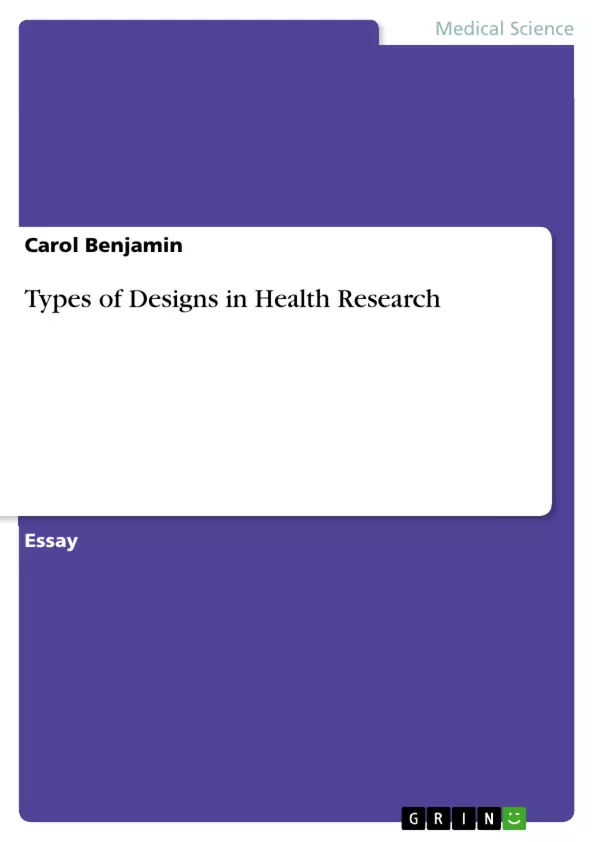This assignment describes the two types of analytic study types in health research. Observational study which includes cross sectional, case-control and cohort are discussed. Randomized controlled trials are briefly discussed as an example of experimental study design. The three major research designs are describes, contrasted and discussed as well as the strengths and limitations.
Inhaltsverzeichnis (Table of Contents)
- Types of Designs in Health Research
- Experimental Design
- Observational Design
- Cohort Studies
- Cross-Sectional Studies
- Case-Control Studies
Zielsetzung und Themenschwerpunkte (Objectives and Key Themes)
This paper aims to provide an overview of the different types of research designs commonly used in health research, particularly focusing on the distinction between experimental and observational studies. It explores the strengths and limitations of each approach, providing a deeper understanding of their suitability for various research questions.
- Experimental vs. Observational Research Designs
- Randomized Controlled Trials as an Experimental Design
- Types of Observational Studies: Cohort, Cross-Sectional, and Case-Control
- Strengths and Limitations of Each Research Design
- Applications of Different Designs in Health Research
Zusammenfassung der Kapitel (Chapter Summaries)
The paper first introduces the concept of research design in health research, emphasizing the importance of selecting an appropriate design for the study. It then delves into the two major categories of analytical studies: experimental and observational. Experimental design is primarily associated with randomized controlled trials (RCTs), which are recognized as powerful tools for investigating the effectiveness of interventions. The paper highlights the role of random allocation in ensuring that all other potential causes are equal between treatment groups, making RCTs ideal for establishing cause-and-effect relationships.
The paper then shifts its focus to observational studies, which do not involve interventions. It examines the three main types of observational studies: cohort studies, cross-sectional studies, and case-control studies. Cohort studies are particularly useful for investigating the incidence and natural history of conditions. They can be either prospective or retrospective, with prospective studies following a group of people over time to observe the development of a specific outcome. Retrospective cohort studies utilize data collected for other purposes, offering a cost-effective approach but potentially lacking complete information on relevant variables.
Schlüsselwörter (Keywords)
This document explores key concepts in health research design, including randomized controlled trials, observational studies, cohort studies, cross-sectional studies, case-control studies, intervention, research question, research design, and research methodology. It emphasizes the importance of selecting an appropriate research design to effectively address research questions and generate reliable findings in the field of health research.
Frequently Asked Questions
What is the main difference between observational and experimental studies?
Experimental studies, such as Randomized Controlled Trials (RCTs), involve an active intervention by the researcher. Observational studies simply observe subjects without any intervention to see how variables interact naturally.
What are the characteristics of a Cohort Study?
Cohort studies follow a specific group of people over time. They can be prospective (following people into the future) or retrospective (looking at existing data from the past) to investigate the incidence of conditions.
When is a Cross-Sectional Study used?
A cross-sectional study analyzes data from a population at a single point in time, often used to determine the prevalence of a disease or condition.
Why are Randomized Controlled Trials (RCTs) considered powerful?
RCTs are ideal for establishing cause-and-effect relationships because random allocation ensures that potential confounding factors are equally distributed between treatment and control groups.
What is a Case-Control Study?
It is an observational study that compares individuals who have a specific condition (cases) with those who do not (controls) to identify factors that may have contributed to the condition.
- Arbeit zitieren
- Carol Benjamin (Autor:in), 2011, Types of Designs in Health Research, München, GRIN Verlag, https://www.grin.com/document/265789



